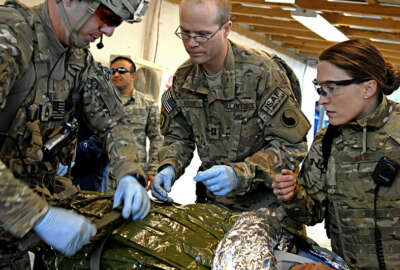House panel suggests increasing military pay, putting off DoD plan to decrease medical billets
The House Armed Services Military Personnel Subcommittee is concerned that DoD still wants to get rid of 18,000 medical positions.
A House panel is recommending some large changes to military policies that deal with issues like sexual assault, military hunger and childcare — but it’s acquiescing two of this year’s blockbuster issues to the full House Armed Services Committee.
The House Armed Services Military Personnel Subcommittee is suggesting a 2.7% pay increase for service members and expanding parental leave for troops to 12 weeks.
However, the subcommittee did not touch whether sex crimes and other nonmilitary crimes should be taken out of the military chain of command or if women should have to sign up for Selective Service. Those issues will have to wait until the full committee meets for its annual marathon markup on Sept. 1.
The Senate Armed Services Committee already finished its version of the bill. It has decided, against the Defense Department’s wishes, to take all nonmilitary crimes out of the chain of command. It also requires women to sign up to be eligible for a draft.
The subcommittee did recommend some other substantial policy changes, however. One of the most notable is instituting a basic needs allowance for low-income service members in high cost areas.
The provision stems from recent studies about hunger within the military. A recent report found that one-third of military respondents were marginally food insecure. Marginally food insecure encompasses individuals who report any indications of compromised economic access to food among themselves and their families, which are classified as having marginal, low or very low food security according to the Agriculture Department’s food security status classification system.
The legislation establishes a Naval Community College for enlisted sailors to gain college credits, an idea that has been in the works for a handful of years.
The subcommittee tackled a handful of military health issues. It requires a pilot program to support post-natal care and establishes a program to prevent fraud and abuse in the Military Health System.
The panel also suggests delaying DoD’s plans to cut thousands of medical billets, something that Congress first put off in the 2020 NDAA.
DoD planned to cut 18,000 billets over about four years. It had already gotten rid of 2,000 through attrition before Congress stepped in. The Pentagon wanted to get rid of the positions to increase military lethality.
The reductions were driven, at least in part, by a congressionally-mandated report detailing how many and what types of medical professionals the military services need to fight wars. The report was delivered two years past its deadline, and its contents are classified.
The subcommittee markup would require more analysis of the realignment.
While the subcommittee is leaving the bigger decision of sexual assault prosecutions in the military to the full committee, it did recommend some provisions on the issue.
Provisions include increasing notification to sexual assault survivors about the outcomes of administrative actions against their perpetrators and ensuring every separation board has a legal officer to record events.
Copyright © 2025 Federal News Network. All rights reserved. This website is not intended for users located within the European Economic Area.
Scott Maucione is a defense reporter for Federal News Network and reports on human capital, workforce and the Defense Department at-large.
Follow @smaucioneWFED






